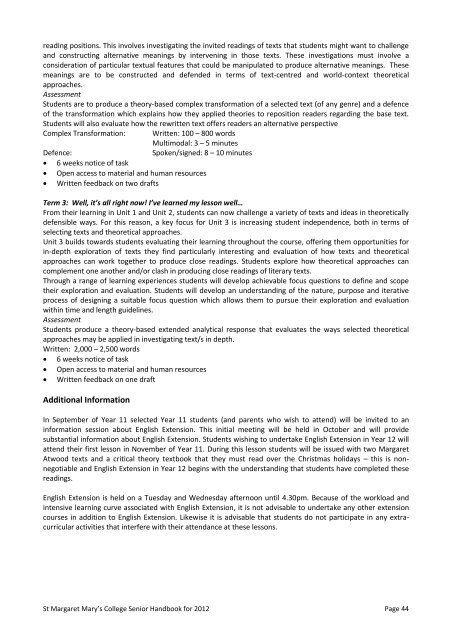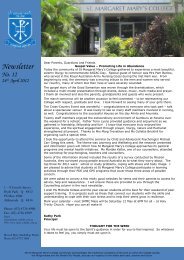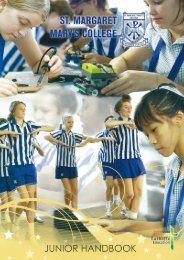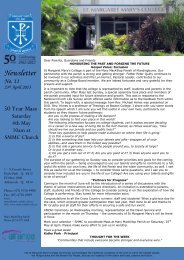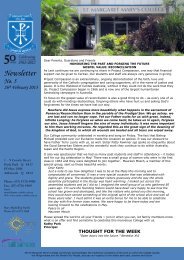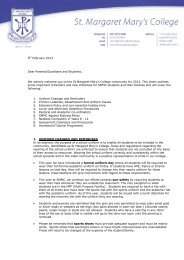SENIOR HANDBOOK for 2012
PRINCIPAL'S MESSAGE - St Margaret Mary's College
PRINCIPAL'S MESSAGE - St Margaret Mary's College
- No tags were found...
You also want an ePaper? Increase the reach of your titles
YUMPU automatically turns print PDFs into web optimized ePapers that Google loves.
eading positions. This involves investigating the invited readings of texts that students might want to challenge<br />
and constructing alternative meanings by intervening in those texts. These investigations must involve a<br />
consideration of particular textual features that could be manipulated to produce alternative meanings. These<br />
meanings are to be constructed and defended in terms of text-centred and world-context theoretical<br />
approaches.<br />
Assessment<br />
Students are to produce a theory-based complex trans<strong>for</strong>mation of a selected text (of any genre) and a defence<br />
of the trans<strong>for</strong>mation which explains how they applied theories to reposition readers regarding the base text.<br />
Students will also evaluate how the rewritten text offers readers an alternative perspective<br />
Complex Trans<strong>for</strong>mation: Written: 100 – 800 words<br />
Multimodal: 3 – 5 minutes<br />
Defence:<br />
Spoken/signed: 8 – 10 minutes<br />
6 weeks notice of task<br />
Open access to material and human resources<br />
Written feedback on two drafts<br />
Term 3: Well, it’s all right now! I’ve learned my lesson well…<br />
From their learning in Unit 1 and Unit 2, students can now challenge a variety of texts and ideas in theoretically<br />
defensible ways. For this reason, a key focus <strong>for</strong> Unit 3 is increasing student independence, both in terms of<br />
selecting texts and theoretical approaches.<br />
Unit 3 builds towards students evaluating their learning throughout the course, offering them opportunities <strong>for</strong><br />
in-depth exploration of texts they find particularly interesting and evaluation of how texts and theoretical<br />
approaches can work together to produce close readings. Students explore how theoretical approaches can<br />
complement one another and/or clash in producing close readings of literary texts.<br />
Through a range of learning experiences students will develop achievable focus questions to define and scope<br />
their exploration and evaluation. Students will develop an understanding of the nature, purpose and iterative<br />
process of designing a suitable focus question which allows them to pursue their exploration and evaluation<br />
within time and length guidelines.<br />
Assessment<br />
Students produce a theory-based extended analytical response that evaluates the ways selected theoretical<br />
approaches may be applied in investigating text/s in depth.<br />
Written: 2,000 – 2,500 words<br />
6 weeks notice of task<br />
Open access to material and human resources<br />
Written feedback on one draft<br />
Additional In<strong>for</strong>mation<br />
In September of Year 11 selected Year 11 students (and parents who wish to attend) will be invited to an<br />
in<strong>for</strong>mation session about English Extension. This initial meeting will be held in October and will provide<br />
substantial in<strong>for</strong>mation about English Extension. Students wishing to undertake English Extension in Year 12 will<br />
attend their first lesson in November of Year 11. During this lesson students will be issued with two Margaret<br />
Atwood texts and a critical theory textbook that they must read over the Christmas holidays – this is nonnegotiable<br />
and English Extension in Year 12 begins with the understanding that students have completed these<br />
readings.<br />
English Extension is held on a Tuesday and Wednesday afternoon until 4.30pm. Because of the workload and<br />
intensive learning curve associated with English Extension, it is not advisable to undertake any other extension<br />
courses in addition to English Extension. Likewise it is advisable that students do not participate in any extracurricular<br />
activities that interfere with their attendance at these lessons.<br />
St Margaret Mary’s College Senior Handbook <strong>for</strong> <strong>2012</strong> Page 44


